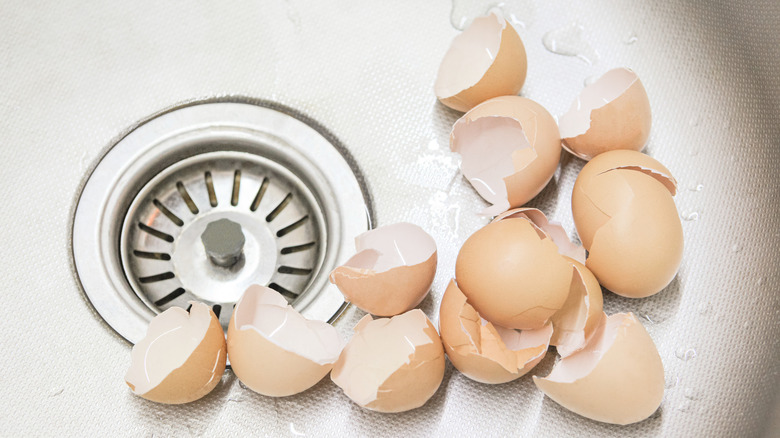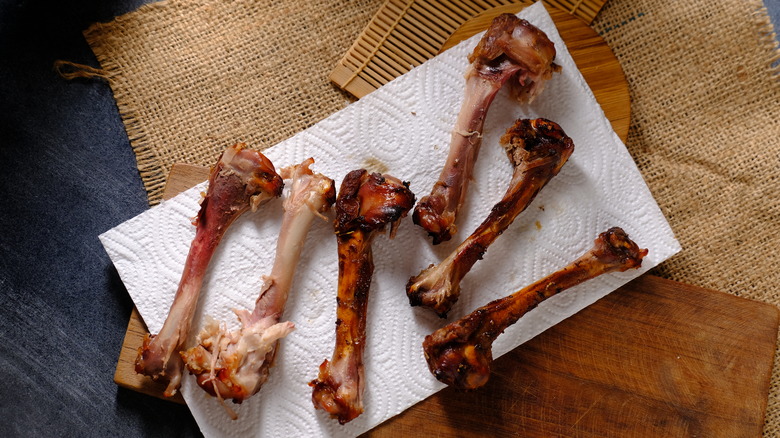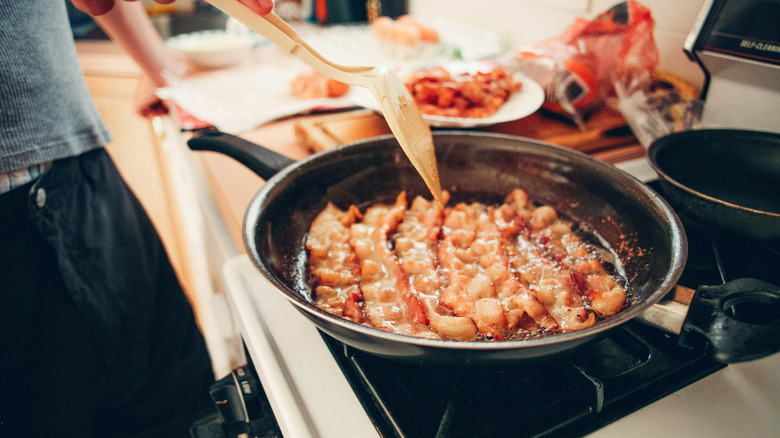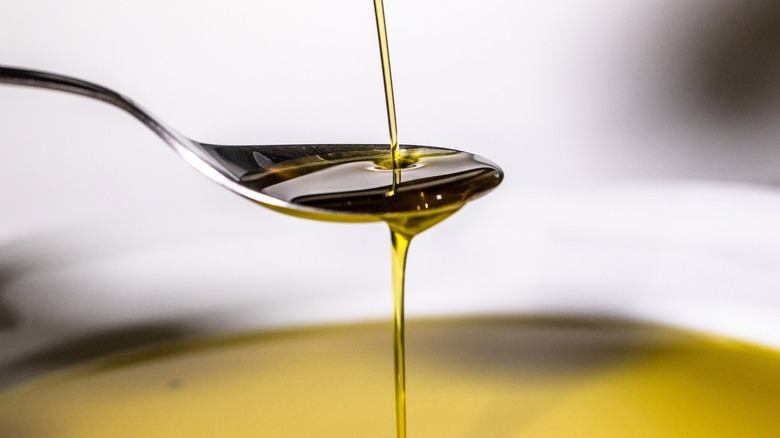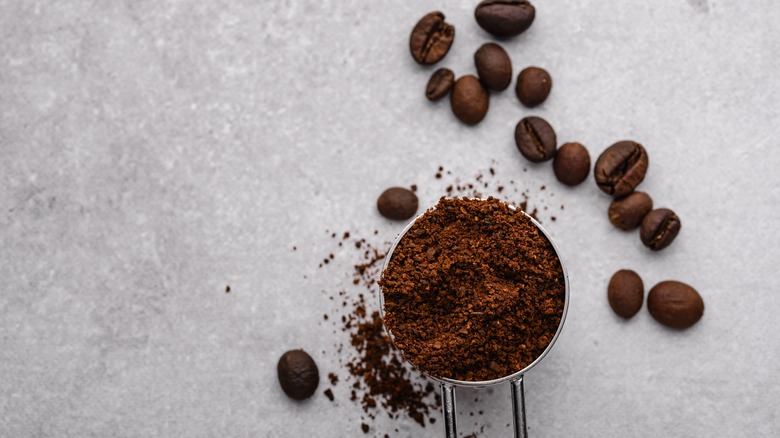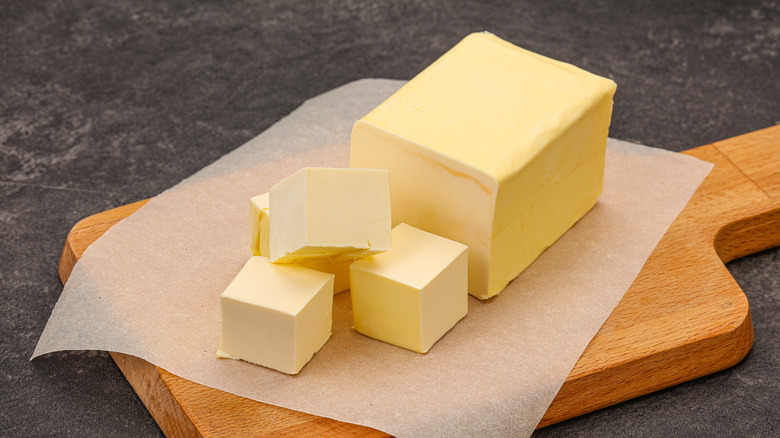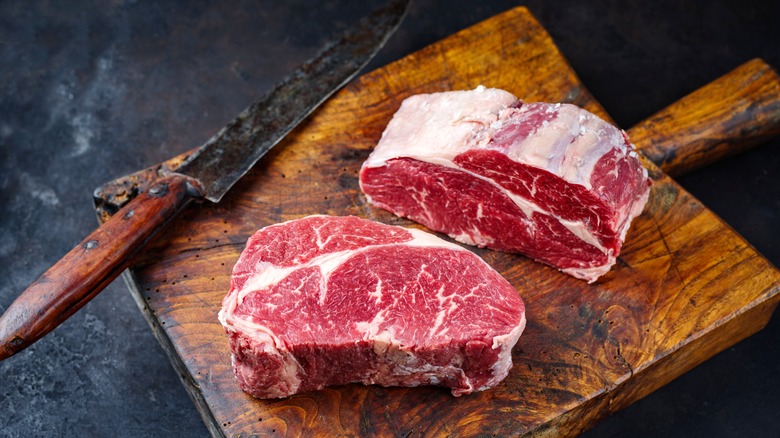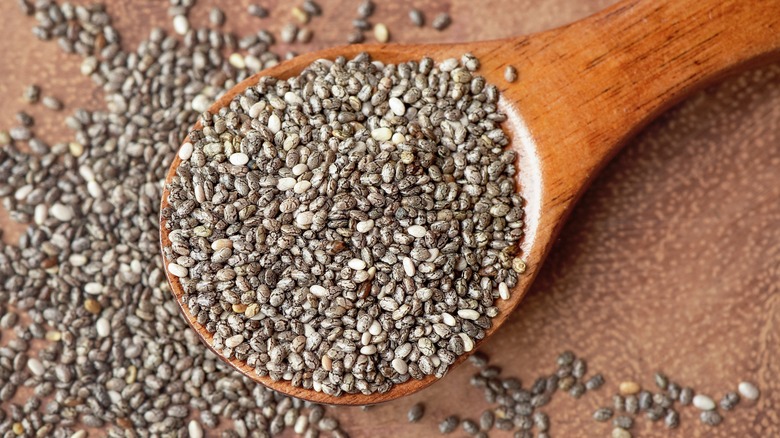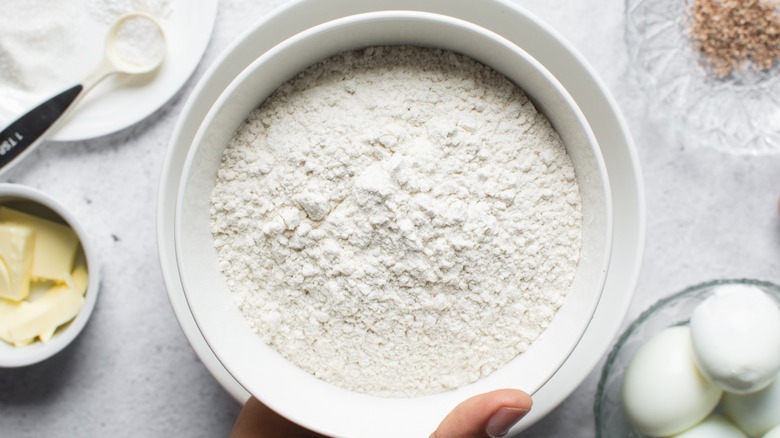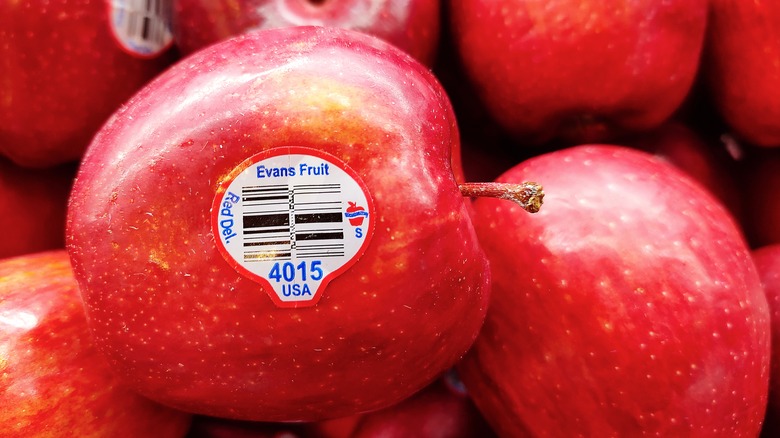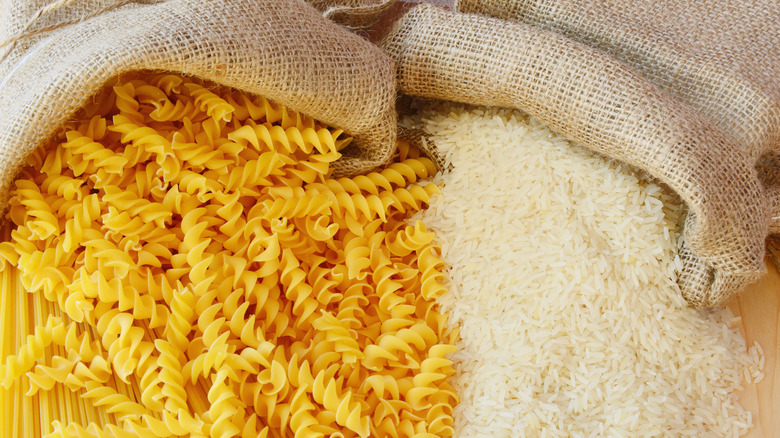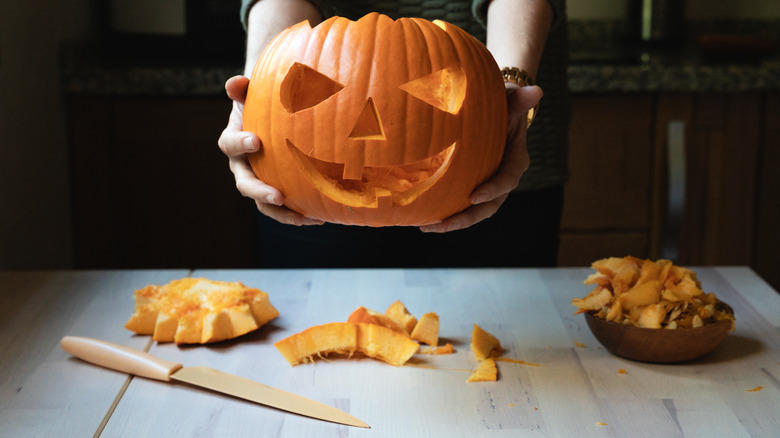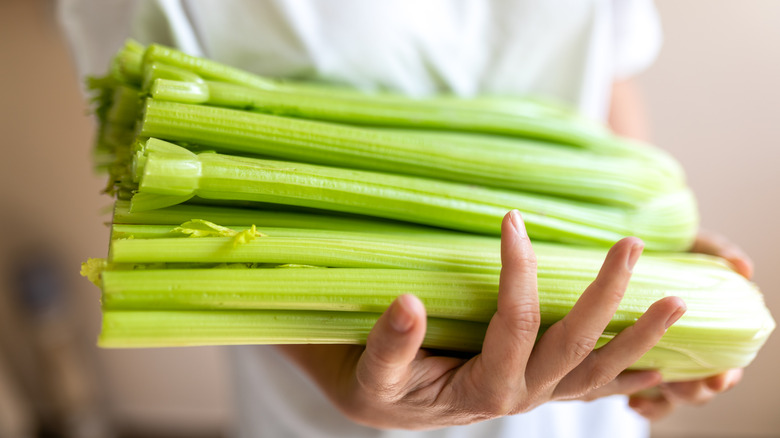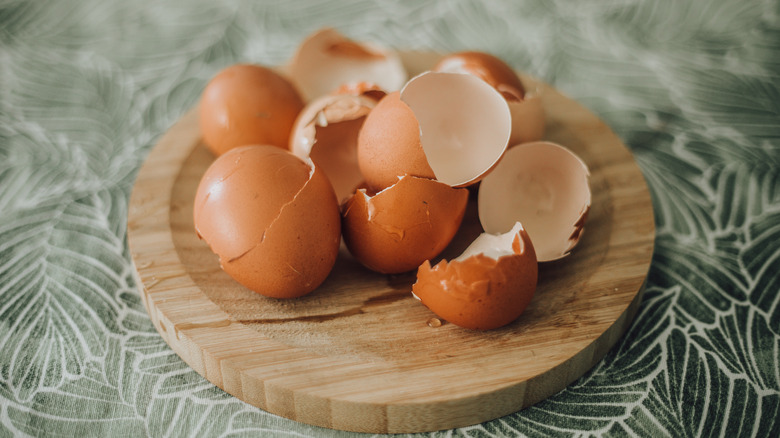Avoid Putting These Foods And Scraps Down Your Drain At All Costs
We've all been there. You're staring at a sink full of dirty dishes after a long day and the temptation to pour everything down the drain is real. Surely the pipes can handle it just this once, right? After all, you've already cooked, why spend ages cleaning? Unfortunately, your kitchen sink isn't as understanding — or forgiving.
You see, not all food waste is meant to go down the drain. Certain foods and scraps can damage your garbage disposal, clog pipes, or even contaminate water supplies. Although you might get away with it a few times, those seemingly harmless decisions can come back to haunt you. All it takes is one stubborn scrap (or an accumulation of small offenders) to create a plumbing nightmare.
If you want to save yourself from a drain disaster (and a hefty plumbing bill), you've come to the right place. In this article, we'll explore foods and scraps you should avoid putting down the sink at all costs. Some of these are obvious, while others may surprise you, so read on to keep those pipes — and that conscience — clear.
Bones
Be careful not to let bones slip down the drain, or your roommates will have a serious bone to pick with you. Bones from poultry, beef, pork, and lamb are too dense and can damage the garbage disposal. Some people may argue that modern, high-horsepower models can handle the challenge. However, most plumbers would encourage you to err on the side of caution (unless of course, they need the business).
But that's not the only reason to avoid putting bones down the sink. Significant chunks of bone can get stuck and pile up, trapping other debris and clogging the drain. Meanwhile, the sharp edges can also damage pipes.
Luckily, fish bones are the exception. They're small enough to pass through the disposal and through your plumbing system without much effort. If you do drop other bones down the drain, act fast. First and foremost, make sure your garbage disposal is turned off and nobody is near the switch. Even with this precaution, we still suggest using a pair of tongs to recover the runaway bones.
Grease
If you're a fan of bacon, you know exactly what to expect when grilling a few slices. The rations leave behind tasty grease that's liquid when piping hot, but as soon as it reaches room temperature, it solidifies. This is exactly why you should never pour grease from bacon or other meats down the drain. You can expect it to cool and congeal, causing a blockage that's hard to eliminate.
It's best to take care of grease immediately after cooking. While your pan is still hot, pour the grease into a small glass container and set it aside. Once it reaches room temperature, it'll become white and waxy. At this point, it'll be easy to grab a paper towel and scoop it directly into the trash.
If you hate food waste, don't throw your bacon grease away. Instead, filter it while it's still hot to remove any unwanted food particles. Then, place that liquid gold in a small ramekin or glass jar and cover it with a lid. Keep it on your stovetop so you can use it in place of cooking oil. It works well for frying eggs, or sautéing veggies and imparts a rich bacon flavor.
Oil
Just like oil and water don't mix, neither does oil and your drain. Oils high in saturated fat like coconut function similarly to bacon grease and will solidify at room temperature. As soon as the oil hits the cool water in your pipes, you can expect it to harden and potentially cause a backup. That being said, even liquid oils should be avoided. Since fats aren't water-soluble, they can stick to the edges of pipes and collect debris flowing by.
Unfortunately, even if oils do make it through your home plumbing, they can still harm the water supply. They slow sewage systems and end up in groundwater, where they can grow harmful bacteria. So while it's easy to pour excess oil straight from your pan into your sink, we'd reconsider. Alternatively, put that leftover pickle jar to good use by collecting the oil. Once it's full, you can toss the entire thing in the bin.
Coffee grounds
A little coffee grounds here and there seem harmless, but if you're drinking it nearly daily, it could destroy your sink. Think about it. When you make coffee, the grounds clump together, forming a thick sludge. This thick substance isn't going down your drain without a fight, and you can expect water and food to back up right behind up. If you've clogged your pipe with coffee grounds, try using a snake or a plunger before resorting to a plumber.
Better yet, save yourself the trouble and avoid washing coffee grounds down the sink altogether. Toss them directly into the trash or try composting them. When you add coffee grinds to compost bins, they mask any foul smells and work wonders as a fertilizer. The coffee grounds contain nitrogen, potassium, and phosphorus to help plants grow, and using them couldn't be easier. You can mix used coffee grounds into compost or worm bins or drop them directly on the soil on occasion.
Fats
There's nothing quite as satiating as fatty foods. Think cheese, butter, chicken skin, and meat fat. But while we crave that deliciously fatty flavor, it can be challenging to eat too much in one sitting. After all, these foods are super rich and take longer to break down, both in your stomach and the drain. So if you can't finish the fatty portion of your meal, avoid tossing it down the sink.
Since fats tend to be sticky and dense, they cling to each other in pipes. They can build up quickly and block other food and liquid from passing smoothly. To make matters worse, fats can contribute to the aptly named fatbergs. A fatberg is a hardened mass consisting of — you guessed it — fats. But not solely fats. These fats work like glue, attracting other objects in drains, and become larger and larger over time until they wreak havoc on entire sewer systems. The Baltimore City Department of Public Works reported such an incident when a massive fatberg blocked the city's drainage system, sending almost 1.2 million gallons of overflowing sewage into the streets.
So how do you properly dispose of fats? Throw them away in your trash can. Avoid the compost since they don't decompose as quickly as produce and they tend to leave a nasty stench or grow harmful bacteria. And if they do end up clogging your drain, you'll have to get creative. Try boiling water, baking soda, or even Coke to break down some of the fat.
Meat trimmings
Fat isn't the only portion to worry about when disposing of meat. Meat trimmings, including muscle, don't break down well in the drain because they're dense and fibrous. It can stick to the sides of pipes and slowly rot, creating an increasingly bad smell. Or, they trimmings become stringy and wrap themselves around other scraps. This goes for both raw and cooked products. Instead, we suggest playing it safe by tossing meat trimmings in the garbage.
However, if you're worried about putting meat trimmings in the garbage bin, we completely understand. Unless you're about to take out the trash, it can stink up your whole kitchen or cause a sanitation issue. According to the USDA, room-temperature meat starts to grow bacteria at an alarming rate in as little as two hours.
Luckily, we have a food waste hack perfect for this occasion: gather the leftover meat trimmings in a sealed plastic bag and place it in the freezer. This will prevent the meat from spoiling until trash day. Just don't forget what's in there, or you'll be sorely disappointed in a few months.
Pits and seeds
Pits are another obvious no-no when it comes to your kitchen sink. Consider them small rocks that will grind against that garbage disposal or get wedged into your drain. Avocados, peaches, and cherry pits all belong in the trash. However, this rule also applies to smaller fruit seeds like watermelon or citrus. They're small enough to escape the disposal impeller but can crawl into small crevices and slow traffic over time.
Meanwhile, seeds like flax and chia should also be spared. They may seem small enough to be harmless, but they collect, especially since you don't wash down just one. Plus, these seeds are known for absorbing water and when they do, they become sticky and cling to one another. This process happens quickly, too. Chia seeds start expanding in just a few minutes, growing exponentially in size. Eventually, they develop a gelatinous texture that moves at a glacial pace through drains.
If you happen to drop those leftover chia seeds down the disposal, forget about digging them out. However, there are some tricks to remove the slimy mass. On Reddit, one helpful commenter said "The best way is to fill the sink up as high as you can, then pull the plug and give it a good flush!" We recommend using hot water to soften the texture, as well.
Flour
What happens when you mix water and flour? It forms a thick substance — think pancake batter. This substance won't harm the disposal, but it doesn't flow smoothly down the drain either. Instead, it coats the pipes.
If you've made pancakes or waffles, scrape the remaining batter into the garbage bin before washing the bowl. An excess amount of flour will only result in much more cleaning down the road. But if you're wondering how much is too much, this Reddit user might have the answer. After accidentally pouring a cup or two of flour down the drain, they experienced immediate drainage issues, "Not thinking, I just rinsed it down. Now the drain is very slow and probably clogged by essentially a gob of dough somewhere down the pipe." Luckily, one helpful respondent suggested that "If it isn't completely stopped then keep running hot water. And the water flowing past should slowly dilute and shrink the dough ball."
Food labels and stickers
While it seems obvious that food labels and stickers don't go down the drain, you'd be surprised just how often they end up there. It's an easy thing to overlook. If you're washing an apple and peeling off the sticker, chances are, you're not going to throw it away; you're going to let it flow down the sink. However, we'd think twice before succumbing to this old habit.
Food labels and stickers can stick to pipes and create a barricade in your drain. They also aren't biodegradable, so they won't break down in the sewage system. And since you can't digest them, we don't recommend eating fruit stickers, either. Instead, toss it in the trash before consumption.
Meanwhile, if you're up-cycling glass jars or wine bottles, you'll need to soak them in water to remove the larger labels. This is easily done in the sink, but to prevent the label from going down the drain, use a stopper. The label should naturally separate, and you can scrub away any remaining stickiness. Just make sure to fish out the entire label before letting the water drain.
Rice and pasta
Rice and pasta are some of the best pantry staples because they're so easy to prepare. Boil some water and add the dried goods, and these foods will quickly absorb water and expand as they cook. Unfortunately, this can be a huge downfall when it comes time to clean up. When washed down the sink, rice and pasta continue to absorb moisture while flowing down the pipes. To make matters worse, these foods are often tossed out in clumps, exacerbating the issue.
If you've ever dumped leftover rice or pasta into your sink, you've learned your lesson. Sadly, one Reddit user committed this clean-up crime for the first time and begged others for suggestions. One person commented that "the rice is most likely stuck in the p-trap. Remove the trap and clean it out. If that doesn't fix the issue call a plumber to snake the line as the block is further down the line." If it is a p-trap issue, we suggest turning off the tap and acting swiftly. The longer the tap runs, the more likely that rice or pasta is to move deeper into the drain.
Pumpkin carvings
As fall approaches and festive families head to the pumpkin patch, they begin brainstorming what type of pumpkin to carve. And as they sit down to create a masterpiece, it's easy to get lost in the excitement. When it's all said and done, we just hope they remember to dispose of their pumpkin carvings properly.
This creative activity creates a serious mess, and it would be convenient to flush it all down the kitchen sink. But pumpkin carvings are dense, fibrous, and stringy; the perfect trifecta to destroy that drain. Plus, the inside of pumpkins are packed with seeds which can easily pile up in those pipes.
It seems obvious that pumpkin carvings belong in your trash can, not your drain. But in an interview with the Calgary Sun, Roto-Rooter Plumbing and Water Cleanup spokesman Paul Abrams explains that his company "deals with this problem every October because homeowners think it's convenient to carve pumpkins in the sink." Rather than spend unnecessary money on a plumber, he suggests carving pumpkins over newspaper, so you can wrap up the mess and neatly throw it away. But if you want to put those carvings to good use, check out these unique ways to cook with pumpkin.
Fibrous foods
Fibrous foods are not friends with your drains. Think banana peels, corn husks, celery, and artichokes. These foods tend to be stringy. The disposal might mash them up a bit, but ultimately, those fibrous strands stick together. They may wrap around the disposal impeller and create an unsightly sludge. But if they make it past, they're still likely to ball up and clog the pipes. Even fruit and veggie peels fall under this category. Although they're not always stringy, they still have a thick, fibrous texture that doesn't break down so easily.
To make matters worse, these fibrous foods don't melt away in hot water. As more and more residue compiles, it can become a tricky issue to solve on your own. So, if your clogged drains are due to fibrous food waste, consider calling a professional plumbing service. And to avoid the issue in the future, toss fibrous foods straight into the compost.
Eggshells
When frying eggs first thing in the morning, plumbing is the last thing on your mind. You're likely cracking eggs into the pan and tossing the shells directly into the sink. Unfortunately, this simple habit won't set you or your sink up for success.
Eggshells cause issues for several reasons. The thin membrane that encompasses the shell is rubbery and can easily wrap around the disposal or other food waste. When the eggshell does crack, it breaks into many small, gritty pieces. We all know how off-putting it can be to bite into eggshells in our omelet. Well, it's those same tiny pieces that can build up in our drainpipes.
Some people believe eggshells are actually beneficial for garbage disposals. As a Reddit user explains, "Someone once told me that they're good for the blades and help to keep it clean and sharp." Unfortunately, they've been misled because disposals aren't traditionally made with blades, but impellers. Instead of sharpening the metal, eggshells get caught up in the impeller and create chaos.
